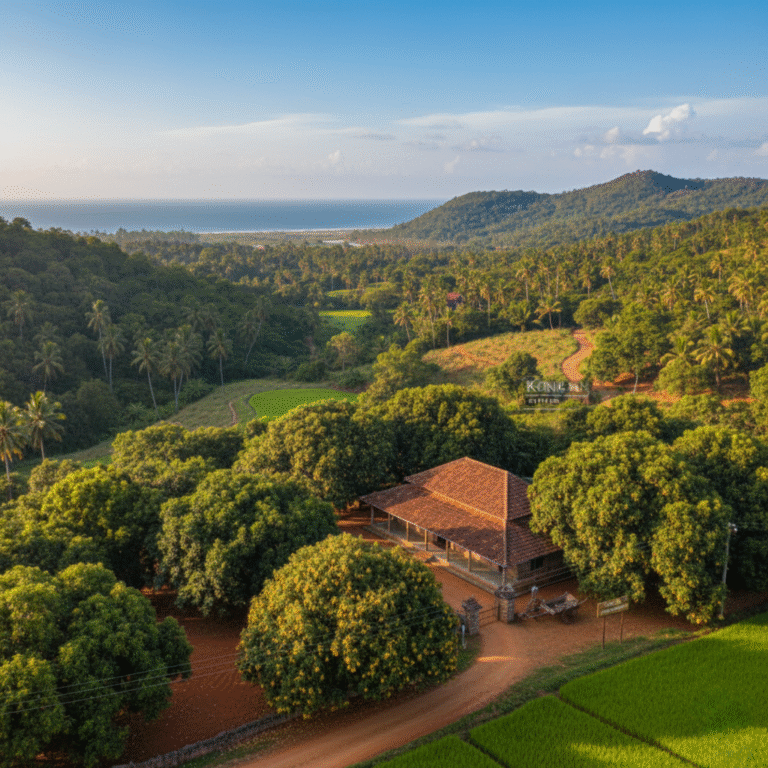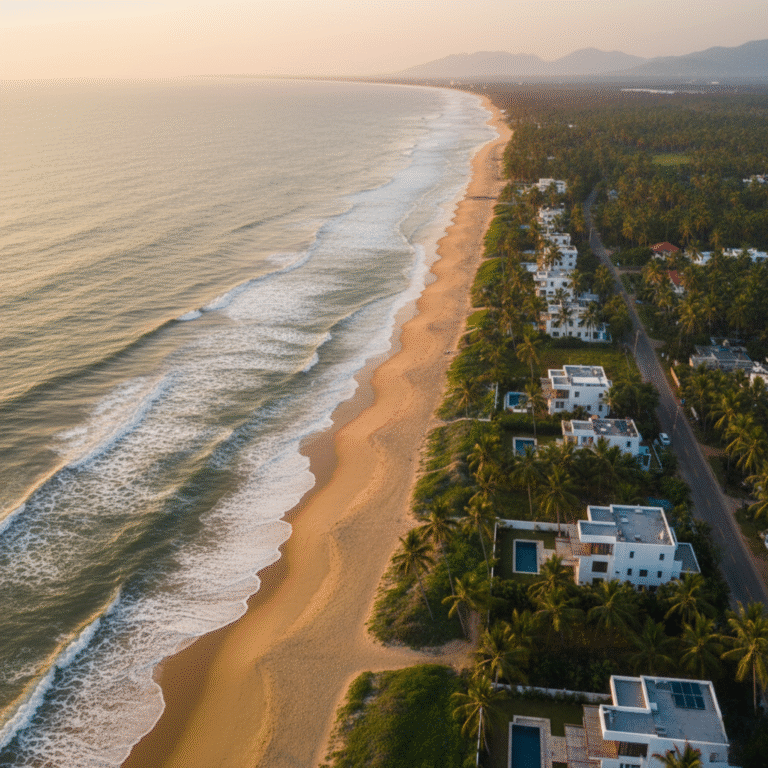In the sun-kissed coastal region of Maharashtra, where the Arabian Sea meets the fertile Konkan soil, grows what many consider the world’s finest mango – the legendary Ratnagiri Alphonso. Known locally as Hapus, this golden treasure has earned its reputation as the “King of Mangoes” through centuries of cultivation perfection, capturing the hearts of fruit connoisseurs worldwide with its unparalleled sweetness, intoxicating aroma, and silky texture that melts on the tongue.
The Ratnagiri Alphonso mango represents more than just a seasonal delicacy; it embodies the rich agricultural heritage of India’s western coast, where traditional farming methods passed down through generations continue to produce this extraordinary fruit that commands premium prices in both domestic and international markets.
The Royal Heritage: A Portuguese Legacy in Indian Soil
The fascinating history of Ratnagiri Alphonso mangoes traces back to the 16th century Portuguese colonial period, when advanced horticultural techniques were introduced to India’s western coastline. Named after Afonso de Albuquerque, a distinguished Portuguese military commander, the Alphonso variety was developed through sophisticated grafting methods that revolutionized mango cultivation in the region.
While Alphonso mangoes are cultivated across various Indian states, the Ratnagiri district’s unique combination of coastal climate, laterite-rich soil, and proximity to the Arabian Sea creates an unmatched terroir that produces mangoes with distinctive characteristics impossible to replicate elsewhere. The saline sea breeze, abundant monsoon rainfall, and mineral-rich soil composition work in perfect harmony to develop the fruit’s signature sweetness, complex flavor profile, and legendary aroma.
The Geographical Indication: Protecting Authenticity
Recognizing the exceptional quality and unique origin of Ratnagiri mangoes, the Indian government awarded them the prestigious Geographical Indication (GI) tag, providing legal protection against imitation and ensuring that only mangoes grown in the designated Ratnagiri region can bear this coveted name. This certification has elevated the fruit’s status in global markets, making it one of India’s most valuable agricultural exports.
The GI tag represents more than legal protection – it acknowledges the generations of farmers who have dedicated their lives to perfecting cultivation techniques, maintaining organic farming practices, and preserving the authentic character of these exceptional mangoes. Today, the majority of Ratnagiri mango growers continue to favor traditional, chemical-free cultivation methods over modern industrial agriculture, ensuring the fruit’s integrity and superior quality.
The Science Behind the Sweetness: What Makes Ratnagiri Mangoes Extraordinary
Several scientific factors contribute to the Ratnagiri Alphonso mango’s exceptional quality and distinctive characteristics that set it apart from other mango varieties worldwide.
Optimal Terroir Conditions
The Ratnagiri district’s coastal location provides an ideal microclimate for mango cultivation. The region’s high humidity levels, consistent sea breezes, and well-distributed rainfall create perfect growing conditions. The laterite soil, rich in iron and aluminum oxides, offers excellent drainage while retaining essential nutrients that contribute to the fruit’s complex flavor development.
Natural Ripening Process
Authentic Ratnagiri Alphonso mangoes undergo natural ripening using traditional methods involving hay, rice straw, or sawdust – completely avoiding harmful chemicals like calcium carbide that are commonly used to artificially ripen mangoes in commercial operations. This natural process allows the fruit to develop its full flavor potential and characteristic aroma.
Distinctive Physical Characteristics
Genuine Ratnagiri Alphonso mangoes are easily recognizable by their medium size, slightly oval shape with a distinctive beak-like tip, and beautiful golden-yellow skin adorned with a subtle reddish blush. The fruit’s smooth, thin skin peels easily, revealing the non-fibrous, creamy pulp that delivers an explosion of sweetness balanced with a mild, pleasant tartness.
Nutritional Powerhouse: Health Benefits Beyond Taste
The Ratnagiri Alphonso mango offers impressive nutritional benefits that complement its extraordinary taste, making it both a delicious treat and a healthy addition to any diet.
Rich Vitamin Content
These mangoes are exceptionally rich in Vitamin A and Vitamin C, essential nutrients that support immune system function, promote healthy skin, and protect vision. A single medium-sized Ratnagiri mango provides a significant portion of the daily recommended intake of these vital vitamins.
Antioxidant Properties
The fruit contains powerful antioxidants including beta-carotene, which gives the mango its golden color, and various phenolic compounds that help combat free radicals and reduce inflammation in the body. These antioxidants contribute to overall health and may help prevent chronic diseases.
Digestive Health Support
Ratnagiri mangoes contain natural enzymes, particularly amylase, which aid in breaking down complex carbohydrates and support healthy digestion. The fruit’s fiber content also promotes digestive health and helps maintain stable blood sugar levels.
Cultivation Excellence: Traditional Methods Meet Modern Quality
The cultivation of Ratnagiri Alphonso mangoes represents a perfect blend of time-honored agricultural traditions and modern quality control practices. Local farmers, many of whom have inherited their orchards through generations, employ sustainable farming methods that prioritize soil health and fruit quality over quantity.
Organic Farming Practices
Most Ratnagiri mango growers have embraced organic cultivation methods, avoiding synthetic pesticides and fertilizers in favor of natural alternatives. This approach not only produces healthier fruit but also maintains the ecological balance of the coastal ecosystem.
Harvesting Techniques
The harvesting of Ratnagiri mangoes is an art form in itself. Experienced farmers carefully hand-pick each fruit at the optimal maturity stage, using traditional techniques that prevent damage and ensure the mangoes continue to ripen naturally. The timing of harvest is crucial – too early and the fruit won’t develop its full flavor potential, too late and the quality deteriorates.
Seasonal Availability
The Ratnagiri mango season typically runs from March to June, with peak quality occurring during April and May. Early season mangoes tend to be slightly more acidic but highly aromatic, while late season fruit achieves maximum sweetness and flavor complexity.
Culinary Traditions: Beyond Fresh Consumption
While Ratnagiri Alphonso mangoes are most commonly enjoyed fresh, they play a starring role in numerous traditional Maharashtrian dishes and contemporary culinary creations.
Classic Preparations
Aamras remains the most popular preparation, featuring pure mango pulp served alongside traditional Indian breads like puris or chapatis. This simple yet elegant dish allows the mango’s natural flavor to shine without any artificial enhancement.
Mango Shrikhand combines the fruit’s sweetness with creamy yogurt, creating a refreshing dessert that’s particularly popular during the hot summer months. The dish represents the perfect balance of indulgence and nutrition.
Traditional Pickles made from raw Ratnagiri mangoes are prized for their complex flavor profiles, combining the fruit’s natural tartness with aromatic spices to create condiments that enhance any meal.
Modern Culinary Applications
Contemporary chefs have embraced Ratnagiri mangoes in innovative ways, incorporating them into international cuisine while respecting their traditional roots. From mango-infused ice creams and sorbets to gourmet cocktails and fine dining desserts, the fruit’s versatility continues to inspire culinary creativity.
Market Dynamics: Understanding the Premium Price
The high cost of authentic Ratnagiri Alphonso mangoes reflects several factors that contribute to their premium market position and limited availability.
Limited Geographic Production
Genuine Ratnagiri mangoes can only be grown in the specific coastal region of Maharashtra, where unique soil and climate conditions exist. This geographic limitation naturally restricts supply, creating scarcity that drives up market prices.
Labor-Intensive Cultivation
The traditional cultivation methods employed by Ratnagiri farmers require significant manual labor, from careful pruning and pest management to hand-harvesting and natural ripening processes. These labor-intensive practices result in higher production costs compared to industrialized farming operations.
Short Harvest Season
The limited three-month harvest season creates intense demand during peak availability, with prices fluctuating based on supply and weather conditions. Premium quality mangoes command the highest prices, particularly those intended for export markets.
Export Quality Standards
Ratnagiri mangoes destined for international markets must meet strict quality standards, including specific size requirements, blemish-free skin, and proper ripeness levels. The additional handling, packaging, and certification requirements contribute to the premium pricing structure.
Identifying Authentic Ratnagiri Mangoes: Consumer Guide
With the growing popularity of Ratnagiri mangoes, the market has become flooded with imitations and chemically-ripened alternatives. Consumers can protect themselves by learning to identify authentic fruit through several key characteristics.
Visual Identification
Genuine Ratnagiri Alphonso mangoes display a distinctive golden-yellow color with a natural red blush on one side. The fruit should have a smooth, thin skin that yields slightly to gentle pressure when ripe. Avoid mangoes with artificial-looking coloring or excessive softness that may indicate chemical ripening.
Aroma Assessment
The most reliable indicator of authenticity is the mango’s natural aroma – a sweet, fruity fragrance that should be noticeable but not overwhelming. Chemically-ripened mangoes often lack this characteristic scent or may have an artificial smell.
Texture and Taste
Authentic Ratnagiri mangoes have a creamy, non-fibrous texture with a perfect balance of sweetness and mild acidity. The flesh should be smooth and easy to eat, without the stringy texture associated with lower-quality varieties.
Sustainable Sourcing: Supporting Traditional Farmers
The future of Ratnagiri mango cultivation depends on supporting the traditional farming communities who have maintained this agricultural heritage for generations. Consumers can contribute to sustainability by choosing suppliers who work directly with local farmers and maintain fair trade practices.
Direct Farm Sourcing
Platforms that source mangoes directly from Ratnagiri farmers help ensure authenticity while providing fair compensation to growers. This direct relationship model eliminates intermediaries and supports the local agricultural economy.
Seasonal Availability Respect
Understanding and respecting the natural seasonality of Ratnagiri mangoes helps maintain sustainable cultivation practices. Avoiding off-season purchases reduces pressure on farmers to use artificial ripening methods or import inferior substitutes.
Storage and Handling: Maximizing Quality
Proper storage and handling techniques are essential for maintaining the quality and extending the shelf life of Ratnagiri Alphonso mangoes.
Ripening Guidelines
Unripe mangoes should be stored at room temperature in a well-ventilated area, away from direct sunlight. Placing them in a paper bag with a banana can accelerate natural ripening. Avoid using plastic bags, which can trap moisture and cause premature spoilage.
Refrigeration Practices
Once fully ripe, mangoes can be refrigerated to extend their shelf life by several days. However, cold storage should only be used for ripe fruit, as refrigerating unripe mangoes can permanently affect their texture and flavor development.
The Future of Ratnagiri Mango Cultivation
Climate change and urbanization present challenges to traditional mango cultivation in the Ratnagiri region. However, innovative approaches combining traditional knowledge with modern technology offer hope for sustaining this precious agricultural heritage.
Climate Adaptation Strategies
Farmers are developing climate-resilient cultivation practices that help mango trees adapt to changing weather patterns while maintaining fruit quality. These strategies include improved water management, soil conservation techniques, and selective breeding for climate tolerance.
Technology Integration
Modern technology is being carefully integrated into traditional farming practices, including precision agriculture techniques, weather monitoring systems, and improved post-harvest handling methods that maintain fruit quality while increasing efficiency.
Conclusion: Preserving a Culinary Legacy
The Ratnagiri Alphonso mango represents far more than a seasonal fruit – it embodies centuries of agricultural wisdom, cultural heritage, and unwavering commitment to quality. Each golden mango tells the story of dedicated farmers who have preserved traditional cultivation methods while adapting to modern challenges.
For consumers seeking authentic Ratnagiri mangoes, the investment in genuine fruit supports not only personal enjoyment but also the continuation of a remarkable agricultural tradition. The experience of tasting a perfectly ripe Ratnagiri Alphonso mango – with its complex flavor profile, intoxicating aroma, and creamy texture – creates memories that last far beyond the brief seasonal availability.
As global appreciation for premium agricultural products continues to grow, the Ratnagiri Alphonso mango stands as a shining example of how traditional farming practices, combined with geographic advantages and cultural dedication, can produce food that transcends mere sustenance to become a celebrated cultural treasure.
The legacy of the Ratnagiri mango continues to inspire new generations of farmers, chefs, and food enthusiasts who recognize that some of life’s greatest pleasures come from the patient cultivation of nature’s finest offerings. In a world increasingly dominated by mass production and artificial enhancement, the Ratnagiri Alphonso mango remains a beacon of authenticity, quality, and the enduring power of traditional agricultural practices.
The Ratnagiri mango season typically runs from March to June, with peak quality occurring in April and May. For authentic, naturally-ripened Ratnagiri Alphonso mangoes, purchase from certified suppliers who work directly with local farmers and can provide GI tag verification.


